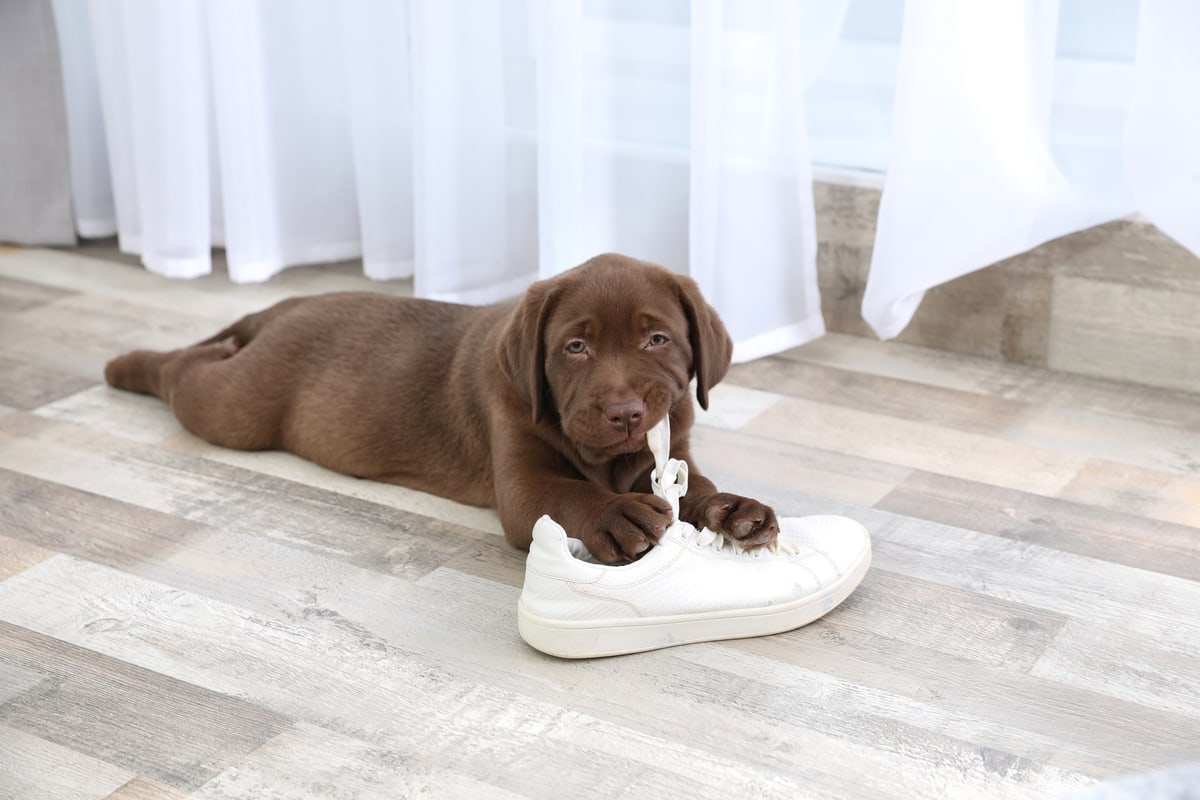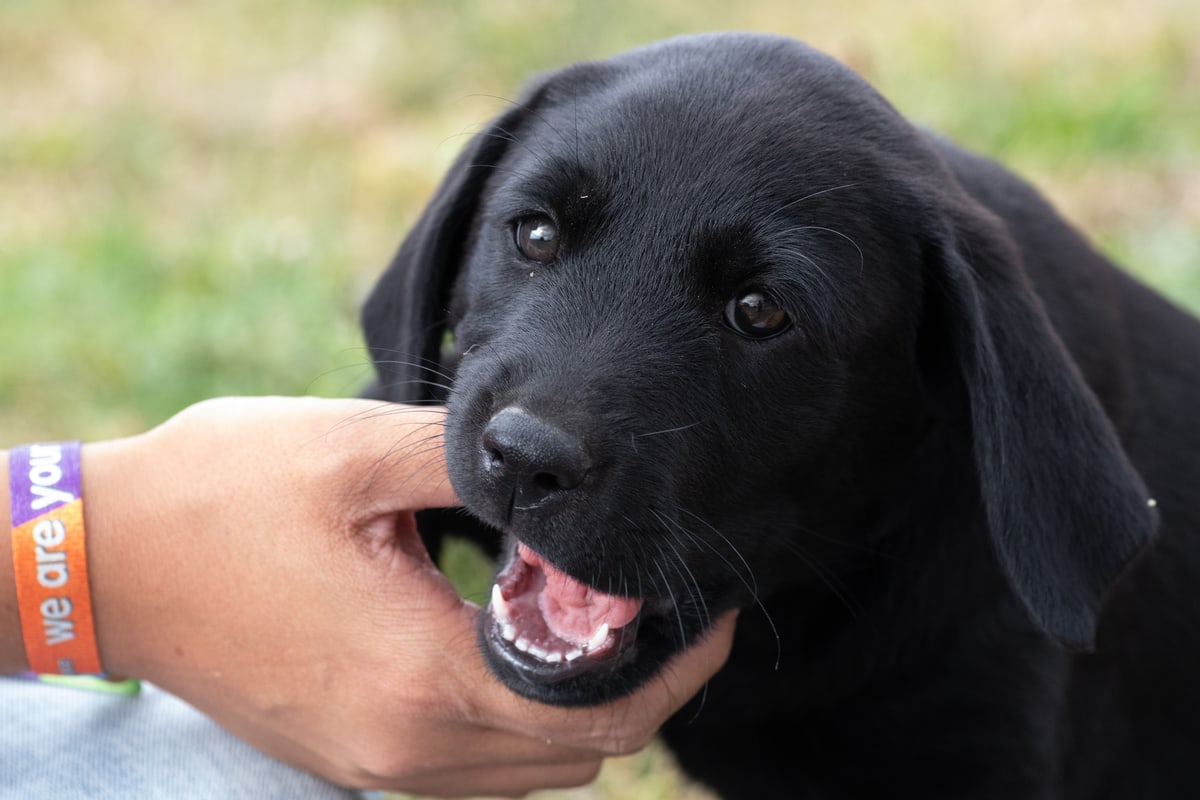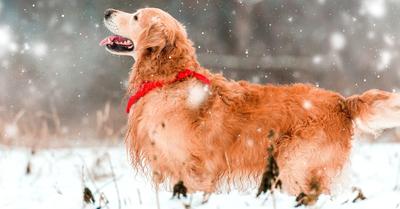In this article
Why Do Lab Puppies Bite So Much?
Lab puppies use their mouths to explore their environment and gather important information. When puppies are growing their adult teeth, they will often chew to soothe the ache along their gums. Labs may also bite to play or out of fear and aggression.
Biting for Sensory Information
When a puppy bites something, they learn how hard they can bite it, what it tastes like, how it feels, and if they can bite it again. All of this information is stored in a mental catalog your dog looks back on when encountering a similar object.
This learning process is very important for puppies to become well-socialized dogs. When a puppy bites another puppy too hard they will lose their playmate. Biting too hard can have negative repercussions!
Biting for sensory information is a totally normal behavior for puppies and even adult dogs. Since they don't have hands to explore with, their mouths are the only option. However, if you don't want your dog's mouth on you or your belongings, there are ways to stop this biting (but we'll get to that later!)
Biting for Teething
As your Lab matures, their mouths will start to change. Once their adult teeth begin to push up through their gums, the teeth they were born with begin to fall out one by one. It is the same process humans go through when their baby teeth come in and are later replaced with adult teeth.
Just like with humans, this process is somewhat painful and incredibly uncomfortable. To help quicken the process, puppies will chew on things to wear down the gum between the new tooth and their mouth. This practice is also very soothing for puppies, especially if they chew on something cold.
Biting for Play vs Biting for Aggression
In the wild, dogs and wolves play by wrestling around and biting one another. Since your dog sees you as a member of its pack, they will try to play with you in a similar way. Of course, this biting still isn't ideal, but it's important to know the difference between play and real aggression.
When a dog bites out of aggression, it is because they are scared, or you are asking them to do something they really don't want to do. Biting out of aggression is important to watch and fix at a young age so you don't end up with an aggressive dog.
The most significant indicator of aggressive biting is body language. When a puppy is being playful, their body and facial muscles are relaxed. When a puppy is biting out of aggression, their body will be stiff or frozen, their face will have a lot of tension in it, and their lips may be pulled back in a snarl or growl.
If you are seeing a lot of aggression in your puppy, you should contact your Veterinarian to make sure they are not in pain. When a dog suddenly becomes aggressive, they may have an unseen condition that is causing them to lash out. If you get a clear bill of health, you should seek the help of a professional trainer to help you.

When Do Lab Puppies Stop Biting?
As we said earlier, as your Labrador matures, they will start to develop adult teeth. This change usually occurs around 12 to 16 weeks of age; the process will reach its end at about 7 months. Therefore, if your Lab is biting to soothe its gums, then the biting should end around the same time their teeth have fully grown in.
If your puppy is biting for sensory information and play, it will lessen as your Lab matures and begins to slow down. While there is no magic number that says when your Lab will calm down, it usually happens between the ages of 2 and 4.
How to Stop Your Lab From Biting
Before we get into preventing biting, let's go over what you should NEVER do when your Lab is biting. First, don't hit your puppy as punishment. They aren't doing anything wrong in their mind because biting is natural. You also can't decide when it is and isn't okay to bite. Doing so can cause great confusion.
When trying to prevent your Lab from biting, a few tips can help you. Exercise, training, redirecting, and positive affirmations are your secret weapons against those adorable, tiny, sharp teeth.
Exercise
Exercising your Lab daily will cause them to be too exhausted to do anything but sleep, let alone bite you. You can exercise your Lab by playing fetch, going on walks, or using enrichment toys.
Training
First, I recommend formal fundamental training before attempting anything specialized.
Training your Lab not to bite sounds complicated, but it can be as easy as slapping some butter and seasoning on. If your Lab is biting YOU, put some butter on your arms and clothes wear they like to bite you. Show the butter to your Lab, and when they lick at it, say "yes, kisses, yes." I suggest doing this before you play with your Lab to reinforce this training. This associates the word "kisses" with the act of licking and the yummy taste your dog gets. The next time your Lab tries to bite you, say "kisses," they should start to lick you instead as they try for the yummy taste.
If your Lab is biting furniture or shoes, there is another approach. Grab a spicy seasoning, like paprika or taco seasoning, and sprinkle it on the places your Lab chews. Then, the next time they go to chew it, they will get a nasty taste in their mouth and leave the thing alone!

Redirecting
Redirecting your dog to things they are allowed to chew on when playing is another way to avoid being bitten. Have some good chew toys handy whenever you are playing with your Lab. When your Lab starts to bite you, show them a chew toy and try directing the bite towards it. After a while, your puppy should go after its toys instead of you. This type of training takes time, but is proven to be very effective.
Positive Affirmation
When your dog does what you want, whether it's licking or going for a proper toy, make sure you give them lots of praise. Tell them how good they are and even provide them with a treat or two!
Final Thoughts
- Biting is a natural part of a Lab's life, but it is crucial to decipher playful nips and aggressive ones.
- Playful body language is loose and relaxed
- Aggressive body language is stiff and snarling
- If you are seeing a lot of aggressive body language in your Lab, make sure they are healthy and contact a trainer
- A Lab will probably stop biting after they stop teething
- If your Lab doesn't stop biting after teething, they should stop upon reaching maturity between 2 and 4 years of age
- Exercise, training, redirecting, and positive affirmation are the best ways to stop biting
- NEVER hit your dog to stop biting.















